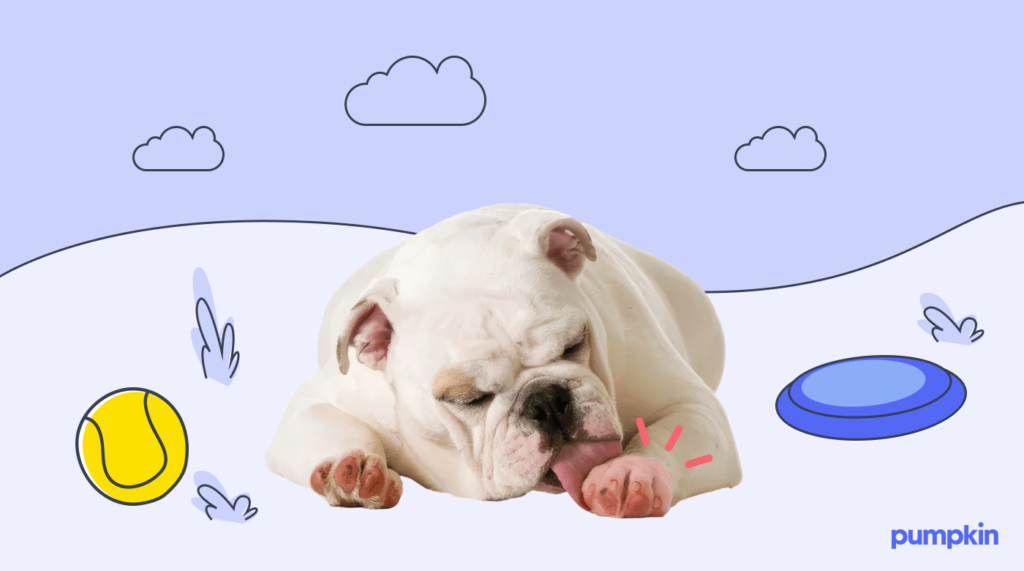Key Points:
- Dogs lick to show affection and to seek attention.
- Dogs may also lick you if they’re feeling anxious.
- Excessive licking can be caused by behavioral or medical issues, and you can discuss changes in behavior with a veterinarian or dog trainer.
Have you ever been greeted by a big slobbery puppy kiss from your dog and wondered, “Why does my dog lick me so much?” Lots of dog owners have asked this same question.
Dogs lick to show affection, get attention, explore the world around them, and as a way to soothe themselves. When they lean in for a smooch, they’re connecting and communicating with you. Play that involves licking can help solidify the bond between you and your pup, while also calming them down. To put it simply, our dogs lick us because they like us.
But, in some cases, excessive licking might indicate an underlying problem.
Ready to uncover the mysteries behind this common canine behavior? Let’s dive into the fascinating reasons why dogs lick people, including the surprising connection to cat kneading.
Why do dogs lick in general?
Is your dog getting the zoomies, stopping only for the occasional lick or bark? We’ve all seen it, and most of the time it’s endearing. Dogs don’t just lick humans — they lick themselves, other dogs, and all kinds of objects. Now, we can’t read our dogs’ minds, but here are some of the most common reasons animal experts believe they lick.
To explore
Dogs have a heightened sense of taste and smell. That makes licking an information-gathering mission. They’re using their tongues to taste and smell the world around them, exploring objects, people, and other animals.
To interact
Dogs also lick other animals to detect pheromones. This gives them clues about the emotional state or health of another animal — including us.
To self soothe
Consider how some humans bite their nails or twirl their hair when they’re nervous. Veterinarians believe that some dogs lick to comfort themselves. This is why you’ll often notice dogs licking themselves or others a lot when they’re in stressful situations.
Because of a medical or behavioral problem
In extreme cases, licking can turn into compulsive behavior. A dog that licks excessively might be suffering from chronic anxiety, boredom, or even a medical problem. For example, when dogs feel sick, they sometimes lick to reduce nausea or discomfort.
Similarly, if they have a wound or a sore spot, they might lick it to soothe the pain.
Why do dogs lick us? Here are 7 reasons
You might assume that licking is your dog’s way of giving a kiss. You’re not entirely wrong. But there are a few reasons why dogs lick your face, your feet, and any patch of skin they can reach.
From seeking attention to showing you they’re not a threat, dogs have lots of motives for licking their favorite humans. Let’s take a look.
1. Sign of affection
Dogs are thought to share a common ancestor with wild canids like wolves, who rely on pack bonds for survival. Wolves lick each others’ muzzles as a sign of submission and affection, and mothers lick their pups to stimulate bodily functions. While domestic dogs have lost a lot of wolf behavior, they share this behavior with their wild cousins.
When dogs lick other dogs, the action releases oxytocin, the “bonding” hormone. For dogs, it feels good to get licked, so they lick you to make you feel good too — it’s a way of showing love.
They’re expressing affection and reinforcing their bond with you, their pack member.
2. Submission and appeasement
Dog licking can also be a sign of submission. When your dog licks you, they’re showing respect and acknowledging you as the alpha in their pack.
Licking reduces their levels of aggression, and it’s a natural, instinctive way to communicate their submission and respect for you.
3. Stress relief
When your dog feels anxious, licking your face can bring them comfort. Licking releases endorphins in dogs’ brains. These hormones make them feel calm. So, if your pup becomes a licker during stressful times, it’s their way of self-soothing.

But be cautious that this stress relief mechanism doesn’t become a compulsion. If dogs struggle to find another way to calm down, this can lead to excessive licking as they become addicted to the endorphin rush.
Left unchecked, dogs may lick themselves until patches of hair fall off and their skin gets raw. If you spot signs of excessive licking or excessive grooming, talk to your vet about this behavior.
4. Grooming
Dogs are natural groomers. They may lick you to help clean you, similarly to how they would clean themselves or their puppies.
This behavior stems from their instinct to keep their pack clean. It’s one of their ways of making sure everyone in the pack is cared for.
5. Attention-seeking
When you respond positively to licking, you reinforce the behavior. If your dog knows they’ll get pets, cuddles, or playtime, then they’ll keep licking to encourage you to give them attention. This creates a positive feedback loop that improves your relationship.
Dogs quickly learn how to get the attention they crave from their favorite human. So, if they get a belly rub and a “Who’s a good boy?” every time they lick you, they’ll keep doing it whenever they need some extra love.
6. You have something on your skin
Ever notice your dog trying to lick you right after you shower? It’s likely because they smell lotion or creams on your skin.
Dogs explore the world through their mouths. If you’re wearing an enticing scent or your dog likes the salty taste of sweat, they’ll want to lick you to get a taste. While feet funk might be a turnoff for humans, it’s one reason your dog licks your feet so much.
7. Neoteny in dogs
You might be surprised to learn that dog licking and cat kneading have something important in common. Neoteny is a phenomenon in animals wherein they retain juvenile behaviors into adulthood, and it’s a very common phenomenon in domesticated animals.
In wild cats and dogs, common juvenile behaviors like kneading and licking fade as they mature, but our pets may keep these behaviors for life. This is one reason why dogs lick your face so much. It’s a puppy-like trait that humans often reward with attention and affection, and so our dogs keep doing it.
Are there dangers to dog licking?
While dog licks are mostly harmless, there are a couple of small risks.
For instance, some veterinarians believe that when dogs lick you, they can transfer antibiotic-resistant bacteria from their mouths to your skin. This can sometimes lead to infections. While germaphobes may cringe at this news, don’t let this possibility stop you from exchanging doggie kisses with your best friend.
Some people are allergic to the proteins in dog saliva. This can cause itching, redness, or hives.
If you notice an adverse reaction after your dog licks you, wash the area thoroughly and speak to a healthcare professional.
Remember though, these risks are relatively rare.
When to set boundaries with licking
While licking is often heartwarming, there are situations where caution is needed.
Hygiene concerns
It’s essential to be mindful of the bacteria in dogs’ mouths. Excessive licking can lead to eczema symptoms or bacterial infections, especially if your dog just gobbled up some questionable substances.
Behavioral problems
If your dog’s licking becomes obsessive or compulsive, it might be a sign of an underlying issue. In such cases, consult with your veterinarian, a dog trainer, or an animal behaviorist for guidance.
Strangers and children
Not everyone is comfortable with doggie kisses. Always ensure your dog respects others’ personal space, especially when interacting with strangers, children, and unknown dogs.
What does excessive licking look like?
Excessive licking goes well beyond affectionate licking. Ultimately, you’ll have to be the judge of when a behavior becomes excessive or compulsive.
Not all excessive licking looks the same, but watch for some of the following signs:
- Persistent and frequent licking that occurs multiple times a day and lasts for long periods.
- If your dog develops a fixation with licking one spot on their body, sometimes to the point of causing soreness to the skin.
- Licking one particular object over and over, often neglecting play and other activities they usually enjoy.

You might also notice these behaviors are accompanied by whining, showing that your dog is experiencing discomfort or distress. Common behavioral issues such as boredom, stress, separation anxiety, or obsessive-compulsive disorder (OCD) can all lead to excessive licking.
How to manage compulsive licking
To manage excessive or compulsive licking, you need to identify the triggers or contexts that lead to this behavior. This way, you can address the root cause.
In the moments your dog starts licking excessively, redirect their behavior. Offer a chew toy or engage them in a play session. This shift of focus distracts them and encourages more positive behaviors. Provide more enriching activities, such as puzzle toys, interactive games, and a regular exercise routine. These activities can help reduce anxiety and boredom.
If none of this works, turn to a professional trainer or animal behaviorist. They’ll offer tailored strategies and techniques that suit your dog.
The verdict: Dogs lick for affection and attention
Those slobbery kisses strengthen your dog’s emotional well-being and build a stronger, more loving bond between you. Licking also helps them relieve stress and affirms that they see you as the leader of the pack.
However, excessive licking can be a sign that something’s not right. If your dog is compulsively licking, you may need to make a vet appointment or attend sessions with a trainer.
When your dog faces an unexpected health problem, Pumpkin dog insurance plans can help you afford the care they need. Worry less about your wallet and more about getting the best possible care for your affectionate pooch.
FAQs
- https://doi.org/10.1007/s10517-023-05932-w
- https://phs-spca.org/licking
- https://journals.plos.org/plosgenetics/article/info:doi/10.1371/journal.pgen.1004016
- https://wolf.org/wolf-info/basic-wolf-info/biology-and-behavior/communication/
- https://go.gale.com/ps/i.do?id=GALE%7CA716600201&sid=googleScholar&v=2.1&it=r&linkaccess=abs&issn=10975322&p=AONE&sw=w&userGroupName=anon%7Ef8fc80b8&aty=open-web-entry
- https://doi.org/10.3390/antibiotics11111490
- https://doi.org/10.1016/j.applanim.2024.106206
- https://www.thekennelclub.org.uk/health-and-dog-care/health/health-and-care/a-z-of-health-and-care-issues/why-does-my-dog-lick-my-feet/
- https://link.springer.com/article/10.1007/s10517-023-05932-w




